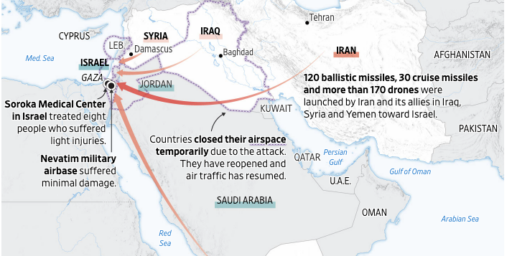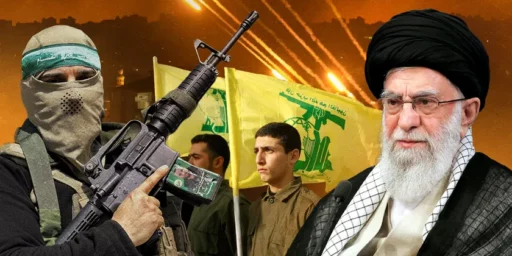Israel Readying Iranian Strike?
Israel is taking steps to prepare for a military strike against Iran, Steve Gutkin reports for the AP.
Israel is building up its strike capabilities amid growing anxiety over Iran’s nuclear ambitions and appears confident that a military attack would cripple Tehran’s atomic program, even if it can’t destroy it.
Such talk could be more threat than reality. However, Iran’s refusal to accept Western conditions is worrying Israel as is the perception that Washington now prefers diplomacy over confrontation with Tehran.
The Jewish state has purchased 90 F-16I fighter planes that can carry enough fuel to reach Iran, and will receive 11 more by the end of next year. It has bought two new Dolphin submarines from Germany reportedly capable of firing nuclear-armed warheads — in addition to the three it already has. And this summer it carried out air maneuvers in the Mediterranean that touched off an international debate over whether they were a “dress rehearsal” for an imminent attack, a stern warning to Iran or a just a way to get allies to step up the pressure on Tehran to stop building nukes.
According to foreign media reports, Israeli intelligence is active inside Iranian territory. Israel’s military censor, who can impose a range of legal sanctions against journalists operating in the country, does not permit publication of details of such information in news reports written from Israel.
I continue to be skeptical of such reports, which we’ve been getting for going on three years now. Still, I’m ever-so-slightly less skeptical about reports of Israeli strikes than American ones.
Amusingly, if that’s the right word, Dave Schuler closed our just-concluded episode of OTB Radio (“Hamdan, Cheeks, and Paris Hilton”) encouraging listeners to “keep an eye out” on Iran after the breakdown of talks today.






Of course Israel has strike plans for dealing with Iran. So does the US, NATO, some of it neighbors, and any number of other nations. Developing plans for all kind of imaginable and unimaginable situations is what all military organizations do. Executing them is another question and as we all know Iran has never given Israel any reason to worry about its safety.
This AP story is singularly devoid of any new facts. It is patently obvious that Israel is contemplating attacking Iran’s WMD facilities, and it is likewise obvious that Israel could carry such an attack off. The IAF has in-flight refueling capability (seven KC135s and some number of KC-130Hs, and by some reports, several KC-10s as well. What the purchase of submarines has to do with this is not clear to me, especially since Isreal was denied the purchase of Tomahawks.
The general AP storyline has Iranian facilities dug deep into their mountains, or else located very close to population centers. How the AP could get close enough to do more than merely speculate along the lines that Iran gives out, I do not know, and it is certain that Israel would not divulge anything at all at this point.
US permission, I believe, is a feint. Does anyone believe that Israel would hold off at our insistence if their own intel told them that the time is now? At the moment Israel has a little leeway in time, but time will close down fast if Obama, a very uncertain quantity to the Israelis, is elected in November. The usual mantra of Iranian counters was trotted out yet again, the net conclusion of which is that in my opinion we would immediately have to become directly involved if the Iranians closed the Straits, racheted up the Iraq war, or went after US facilities worldwide. Also rather obvious.
Must have been a filler story.
If this is old news, well and good, but if more new noise about this comes out of Israel look out. Bush announced the lifting of the offshore drilling ban and the oil markets yawned. A day an a half later when the rumor surfaced that we were sending diplomats to Iran oil prices dropped significantly. The next day the rumor was confirmed and oil has been collapsing ever since. If the war talk heats up, the price of oil will heat up too. Any threat to shipping in the Strait of Hormuz that is taken seriously will push up the price of oil, and the economy gets that final push over the edge. It won’t take much right now.
You’ll probably be a lot less skeptical when Bibi wins the election.
I’m still trying to determine what possible flight path Israel could use that doesn’t require passing through to US dominated air-space.
Michael, here’s a handy map of possible flyover routes. I believe I borrowed that from Strategy Page.
Thanks, do you know if the F-16I can make a trip of that range? Also, I assume that the return path won’t be over Syria, but what would the ramifications on US-Iran relations be if they returned straight back over Iraq? If they can’t make a return trip (either due to fuel or politics), I wonder if they might abandon the planes in the Persian Gulf and pick up their pilots on one of those submarines.
The real question is, if the IAF strike force did fly over US controlled airspace, what would be our reaction? a. Intercept and shoot down? I seriously doubt that possibility; b. Fly along and observe? Quite probable for some flights of US aircraft; c. Join in with our own strike package? This too is a likely scenario, considering that Iranian responses would involve us anyway, so why not do a good job of it to begin with in a coordinated attack? The Jordan-Iraq corridor is the most direct; Jordan can be crossed in a couple of minutes even if they did try to stop the strike, and the IAF would then be over Iraq and flying with US support, including tankers, fighter cover, Jolly Greens, and EW capabilities in the area, plus a couple or three FA-18A squadrons for suppression of ground defenses.
Once you get this far, the target set blows up to include: all air defenses, all military communications and CC sites, all weapon launch sites, especially for the Straits, and, of course, every suspected nuclear development and missile infrastructure site, and any ground or air force concentrations known.
The US cannot afford to let any Israeli strike on Iran fail, in my opinion, or Israel would be seriously weakened and left open to attack herself from a number of directions if it appears that we are sitting it out. We would be “blaimed” in any event for the damage to Iran, and would suffer retaliations ourselves. Once Israel mounts an attack, we will have to support it. IMO.
Yeah, I think we can write off that possibility, unless the US decides to deny Israel the right to fly over Iraq and they did so anyway, in which case we might force them down.
Interesting though, what if the “sovereign” government of Iraq denies Israel access, and requests that the US military defend it’s airspace?
I’m not quite sure what the point in that would be. We’d have to have made prior arrangements in order to pull that off, so we’d effectively be giving them the green flag to fly over Iraq.
That does seem the most likely, even if we don’t participate in the first wave, we’ll be defending ourselves and Israel from Iran’s counter-attack, which will get us involved anyway. Unless we want to leave Israel on it’s own for any counter-attack, which may be a possibility given Israel’s ability to defend itself against Iran’s traditional forces.
That does seem likely, and I must say I’m not at all comfortable with the thought of a foreign nation being able to decide when and how we go to war.
The follow-along possibility could be simply BDA assessments of our own, and to observe what defense is put up by the Iranians, if only to aid followup strikes by us, if needed.
As for Iraq, this time they would be shoved down into their seats and told to shut up, IMO. Unless, we are talking about Obama in the Presidency, God forbid, in which case we would probably have a Constitutional crisis on our hands. That is one reason for believing that the attack might come this year, but after the elections, thus assuring little interference with McCain’s run, and assuring US support till January 20th. After that, the conflict will have been well-launched, and we would be going with the flow.
Michael, regarding the F-16I. It carries enough fuel for the roundtrip when you include the conformal tanks, but not much time-on-station for maneuvering. However, as I pointed out earlier, the IAF has 7 KC-135 and some number of KC-130H’s, which is enough to tank their package on the way out of Iran. If we go in with them too, then tankers are not a problem. Just as in Nam, the tankers might be thrust forward at the outset, with F-15 cover, in order to fill the strikers before they enter Iranian airspace, thus giving them adequate fuel for the return on board, then orbiting tankers would pick up the stragglers that had to burn fuel faster than planned on the way out. All a very complex operation, but quite doable.